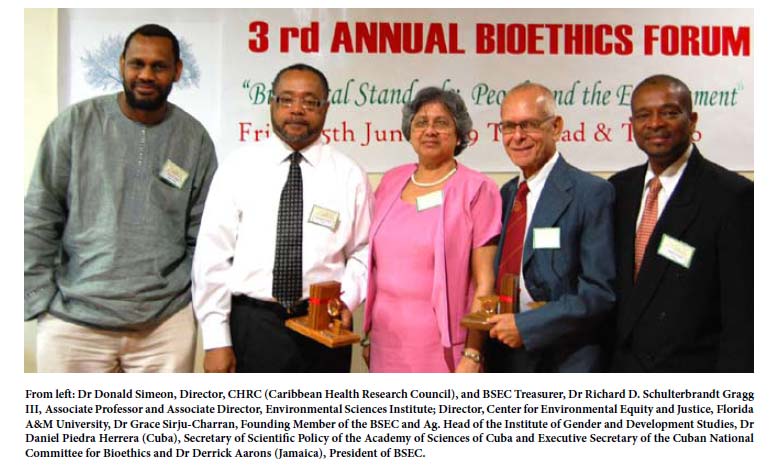 |
 |
 |
|
June 2009
|
The Morality ParadigmThe Bioethics Society of the English-speaking Caribbean (BSEC) hosted its third annual Bioethics Forum on ‘Bioethical Standards: People and the Environment’ at the Centre for Language Learning at The UWI’s St Augustine Campus on World Environment Day. Dr Grace Sirju-Charran, a founding BSEC member and Ag. Head of the Institute of Gender and Development Studies, filed this report. “The second Great Period in the history of mankind is looming large” and will, of necessity, be accompanied by “a radical change in morality.” So proclaimed Dr Daniel Piedra-Herrera, Professor of Biochemistry and Executive Secretary of Cuba National Bioethics Committee, in his feature presentation “Ethics and Bioethics: A Change in Morality” at the opening session of the BSEC 3rd Annual Forum. Close to 100 participants listened with rapt attention as he developed his thesis describing the first Great Period of human history as one characterized by the biological evolution of humans governed by Genetics and Darwinian evolution, followed by the cultural evolution of societies in “Lamarckian” mode, through the “progressive and selective accumulation of knowledge.” Human social constructions, he argued, were based on “immediacy rather than prevision,” and in finding immediate solutions to our problems, we learnt to “favour ourselves in the modification of our environments.” “The strongly inequitable distribution systems…emanate—perhaps unconsciously—from the admission that the creation and accumulation of wealth is the ultimate aim of human life” (my emphasis). “Money” came after “life.” The second Great Period, he suggested requires a paradigm shift centred on “being” and not on “having” and which acknowledges the “essential identity of human beings” dismantling the existing “strong hierarchies” and “the exercise of power by quite a reduced minority of the population, on the absolute majority.” This existing world order is the “fruit of unequal commodity exchange,” he said, and it is anti-scientific and anti-natural, promoting among states asymmetrical political relations. The proposed new world order will organize societies based on the “essential identity of all human beings…It will feature the coherent construction of horizontal, species-centred, and inclusive societies, with an unbounded holistic cultural development and a controlled technological development aimed at its ecological sustainability.” Any deviation in charting this new world order could either optimistically result in either “extinction of the human species resulting from the current ecocide of the planet” or pessimistically in “its self-annihilation in war.” This keynote address together with the reminder by Dr Donald Simeon, Chair of the opening session, that the theme for this year’s World Environment Day was “Your Planet Needs You—UNite to Combat Climate Change” set the tone for the papers to follow. Dr Derrick Aarons, President of BSEC suggested that “justice in health care should include issues such as air pollution, water quality, occupational hazards, safe housing, food and drug safety, pest control, disaster preparedness and literacy.” Elaboration came in the presentations on Flooding by Merle Mendonca of the Guyana Human Rights Association; Asbestos Abatement in a Jamaican community presented by Dr Norbert Campbell; Rodent Control in Trinidad presented by Andrea Mohan; and Air Pollution caused by the Trinidad Cement Plant presented by Ranu Persad. Prof Ralph Robinson presented on Conservation: an Ethic of Resource Use Allocation, and Protection while Dr Paul Tomlin, also from the Mona campus, focused on the inclusion of Bioethics in an Environmental Health Programme for Medical Students in his first presentation and on Medical Students’ Reflections on taking a Spiritual History. Bioethical issues associated with retrospective studies on gastrointestinal illness (SueMin Nathaniel) and helicobacter pylori epidemiology in Trinidad (Nisha Mangroo) and the Role of the EMA in Environmental Protection (Marcia Tinto) were also well received. It was after 6pm when Dr Richard Schulterbrandt Gragg III, Director, Center for Environmental Equity and Justice at Florida A&M University, delivered the lecture on “Bioethics and the Environment.” He highlighted the role and responsibility of humans to the physical environment and other biological life forms within it, recommending that we treat the entire biosphere as a living entity. He suggested that we can no longer continue the practice of interacting with the environment based on preconceived knowledge (epistemology-based ethics), but rather implement the practice of listening to and learning from the environment (ethics-based epistemology). He further argued that the engagement and resolution of environmental and human health issues confronting humanity required a new conceptual framework which integrated bio- and environmental ethics. At the end, the link between human health and a healthy environment was clear.  |
